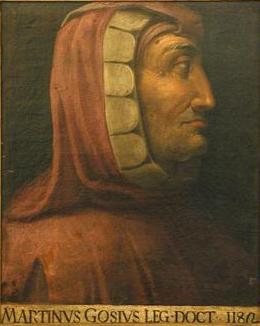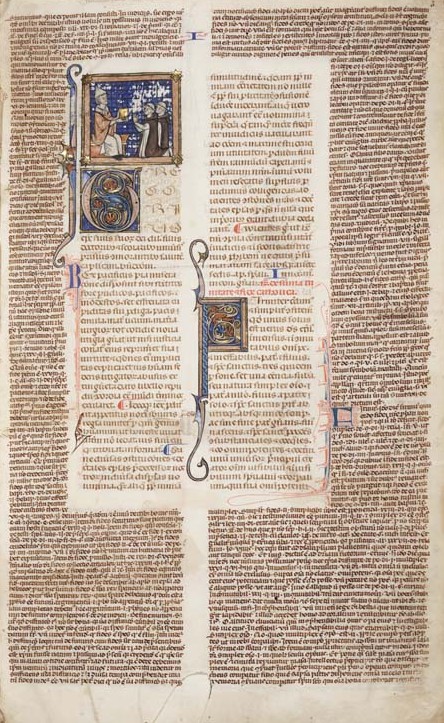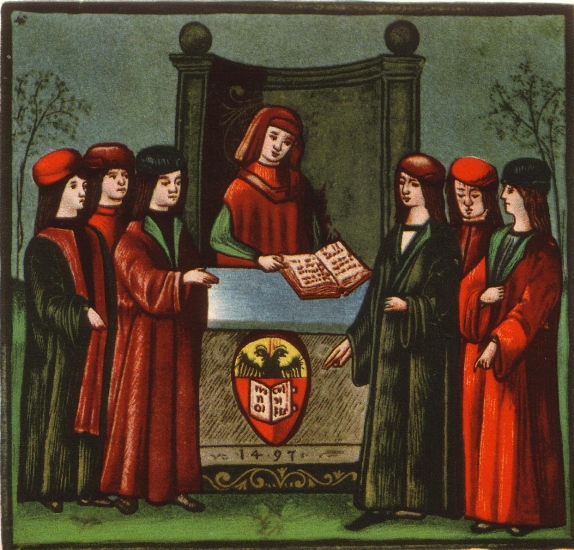|
Bulgarus
Bulgarus was a twelfth-century Italian jurist, born in Bologna. He has been confused with Bulgarinus, a 15th-century jurist. He was the most celebrated of the famous Four Doctors of the law school of the University of Bologna and was regarded as the Chrysostom of the Glossators, being frequently designated by the title of the "Golden Mouth" (''os aureum''). He died in 1166 at a very advanced age. According to popular tradition, all four of the famous Four Doctors (Bulgarus, Martinus Gosia, Hugo de Porta Ravennate and Jacobus de Boragine) were pupils of Irnerius; however, while there is currently no insuperable difficulty in substantiating this claim with regard to Bulgarus, Friedrich Carl von Savigny considered the evidence to be insufficient to support this claim. Martinus Gosia and Bulgarus were the chiefs of two opposite schools at Bologna, corresponding in many respects to the Proculians and Sabinians of Imperial Rome, Martinus being at the head of a school that accommodated ... [...More Info...] [...Related Items...] OR: [Wikipedia] [Google] [Baidu] |
Martinus Gosia
Martinus Gosia was one of the glossators and a 12th-century Italian jurist, counted among the Four Doctors of Bologna, the others being Bulgarus, Hugo de Porta Ravennate and Jacobus de Boragine. Martinus Gosia and Bulgarus were the chiefs of two opposite schools at the University of Bologna, corresponding in many respects to the Proculians and Sabinians of the Roman Empire. Martinus was at the head of a school which accommodated the law to what his opponents styled the equity of the purse (''aequitas bursalis''), whilst Bulgarus adhered more closely to the letter of the law. The school of Bulgarus ultimately prevailed. While the teaching of Bulgarus, became dominant in Bologna, among the ''nostri doctores'', the followers of Martinus, taught in southern France where they became known as the commentators. File:Martinus Gosia – Distinctio de interesse, 12th-century – BEIC 7375381.jpg, ''Distinctio de interesse'', 12th-century manuscript. Wien, Österreichische Nationalbi ... [...More Info...] [...Related Items...] OR: [Wikipedia] [Google] [Baidu] |
Four Doctors
The Four Doctors of Bologna (Latin: ''Quatuor Doctores'') were Italian jurists and glossators of the 12th century, based in the University of Bologna: Bulgarus, Martinus Gosia, Jacobus de Boragine and Hugo de Porta Ravennate. Their teachings in the law school of Bologna were based on glosses and commentaries on the rediscovered ''Corpus juris civilis'' of Justinian. Martinus may have studied with the founder of legal scholarship in Bologna, Irnerius.Peter Landau, "The development of law" in ''The New Cambridge Medieval History'' :124f. The revived importance of Roman law, in the form of medieval Roman law, embodied by the ''Quattuor Doctores'' made its first impact in the political arena in 1158, when they gave their support to Frederick Barbarossa's Diet of Roncaglia in his conflict with the Italian communes over imperial rights in Lombardy. Of the four the strongest contrast in interpretations of the revived Roman law were Bulgarus and Martinus. Bulgarus took the law at fac ... [...More Info...] [...Related Items...] OR: [Wikipedia] [Google] [Baidu] |
Jacobus De Boragine
Jacobus de Boragine was one of the Glossators, and Four Doctors of Bologna. Also known as Jacobus, he was born in the early 12th century and was an Italian lawyer, one of four students of Irnerius called the ''Quattuor Doctores'', although Savigny disputes the general tradition of his inclusion in this list. The other doctors were Bulgarus, Martinus and Hugo. The legal philosophy of Bulgarus adhered closely to the letter of the law while their fellow, Martinus, took a more natural law and Equity approach. His time at Bologna was therefore one of the formative times in legal theory. He was an author of many parts of the Gloss of the ''Corpus juris civilis The ''Corpus Juris'' (or ''Iuris'') ''Civilis'' ("Body of Civil Law") is the modern name for a collection of fundamental works in jurisprudence, issued from 529 to 534 by order of Justinian I, Byzantine Emperor. It is also sometimes referr ...''. *The legal commentary ''De Regulis Juris'', which Savigny ca ... [...More Info...] [...Related Items...] OR: [Wikipedia] [Google] [Baidu] |
University Of Bologna
The University of Bologna ( it, Alma Mater Studiorum – Università di Bologna, UNIBO) is a public research university in Bologna, Italy. Founded in 1088 by an organised guild of students (''studiorum''), it is the oldest university in continuous operation in the world, and the first degree-awarding institution of higher learning. At its foundation, the word ''universitas'' was first coined.Hunt Janin: "The university in medieval life, 1179–1499", McFarland, 2008, , p. 55f.de Ridder-Symoens, Hilde''A History of the University in Europe: Volume 1, Universities in the Middle Ages'' Cambridge University Press, 1992, , pp. 47–55 With over 90,000 students, it is the second largest university in Italy after La Sapienza in Rome. It was the first place of study to use the term ''universitas'' for the corporations of students and masters, which came to define the institution (especially its law school) located in Bologna. The university's emblem carries the motto, ''Alma Mater Studio ... [...More Info...] [...Related Items...] OR: [Wikipedia] [Google] [Baidu] |
Glossators
The scholars of the 11th- and 12th-century legal schools in Italy, France and Germany are identified as glossators in a specific sense. They studied Roman law based on the '' Digesta'', the ''Codex'' of Justinian, the ''Authenticum'' (an abridged Latin translation of selected constitutions of Justinian, promulgated in Greek after the enactment of the ''Codex'' and therefore called ''Novellae''), and his law manual, the '' Institutiones Iustiniani'', compiled together in the '' Corpus Iuris Civilis''. (This title is itself only a sixteenth-century printers' invention.) Their work transformed the inherited ancient texts into a living tradition of medieval Roman law. The glossators conducted detailed text studies that resulted in collections of explanations. For their work they used a method of study unknown to the Romans themselves, insisting that contradictions in the legal material were only apparent. They tried to harmonize the sources in the conviction that for every legal questi ... [...More Info...] [...Related Items...] OR: [Wikipedia] [Google] [Baidu] |
Joannes Bassianus
Joannes Bassianus was an Italian jurist of the 12th century. Life Little is known of his origin, but he is said by his jurist contemporary Carolus de Tocco (Carlo di Tocco) to have been a native of Cremona. He was a professor in the law school of Bologna, the pupil of Bulgarus, and the master of Azo. The most important of his writings which have been preserved in his ''Summary on the Authentica'', which Savigny regarded as one of the most precious works of the Glossators. Joannes, as he is generally termed, was remarkable for his talent in inventing ingenious forms for explaining his ideas with greater precision, and perhaps his most celebrated work is his "Law-Tree," which he entitled ''Arbor Actionum'', and which has been the subject of numerous commentaries. The work presents a tree, upon the branches of which the various kinds of actions are arranged after the manner of fruit. The civil actions, or ''actiones stricti juris'', being forty-eight in number, are arranged on one si ... [...More Info...] [...Related Items...] OR: [Wikipedia] [Google] [Baidu] |
Italy
Italy ( it, Italia ), officially the Italian Republic, ) or the Republic of Italy, is a country in Southern Europe. It is located in the middle of the Mediterranean Sea, and its territory largely coincides with the homonymous geographical region. Italy is also considered part of Western Europe, and shares land borders with France, Switzerland, Austria, Slovenia and the enclaved microstates of Vatican City and San Marino. It has a territorial exclave in Switzerland, Campione. Italy covers an area of , with a population of over 60 million. It is the third-most populous member state of the European Union, the sixth-most populous country in Europe, and the tenth-largest country in the continent by land area. Italy's capital and largest city is Rome. Italy was the native place of many civilizations such as the Italic peoples and the Etruscans, while due to its central geographic location in Southern Europe and the Mediterranean, the country has also historically b ... [...More Info...] [...Related Items...] OR: [Wikipedia] [Google] [Baidu] |
Accursius
__NOTOC__ Accursius (in Italian ''Accursio'' or ''Accorso di Bagnolo''; c. 11821263) was a Roman jurist. He is notable for his organization of the glosses, the medieval comments on Justinian's codification of Roman law, the ''Corpus Juris Civilis''. He was not proficient in the classics, but he was called "the Idol of the Jurisconsults". Biography Accursius was born at Impruneta, near Florence. A pupil of Azo, he first practised law in his native city, and was afterwards appointed professor at Bologna, where he had great success as a teacher. He undertook to arrange into one body the tens of thousands of comments and remarks upon the ''Code'', the '' Institutes'' and '' Digests''. Accursius assembled from the various earlier glosses for each of these texts a coherent and consistent body of glosses. This compilation, soon given the title ''Glossa ordinaria'' or ''magistralis'', and usually known as the ''Great Gloss'', was essentially complete at about 1230. While Accursius was ... [...More Info...] [...Related Items...] OR: [Wikipedia] [Google] [Baidu] |
12th-century Italian Jurists
1 (one, unit, unity) is a number representing a single or the only entity. 1 is also a numerical digit and represents a single unit of counting or measurement. For example, a line segment of ''unit length'' is a line segment of length 1. In conventions of sign where zero is considered neither positive nor negative, 1 is the first and smallest positive integer. It is also sometimes considered the first of the infinite sequence of natural numbers, followed by 2, although by other definitions 1 is the second natural number, following 0. The fundamental mathematical property of 1 is to be a multiplicative identity, meaning that any number multiplied by 1 equals the same number. Most if not all properties of 1 can be deduced from this. In advanced mathematics, a multiplicative identity is often denoted 1, even if it is not a number. 1 is by convention not considered a prime number; this was not universally accepted until the mid-20th century. Additionally, 1 is the ... [...More Info...] [...Related Items...] OR: [Wikipedia] [Google] [Baidu] |
Jacques Cujas
Jacques Cujas (or Cujacius) (Toulouse, 1522 – Bourges, 4 October 1590) was a French legal expert. He was prominent among the legal humanists or ''mos gallicus'' school, which sought to abandon the work of the medieval Commentators and concentrate on ascertaining the correct text and social context of the original works of Roman law. Biography He was born at Toulouse, where his father, surnamed Cujaus, was a fuller. Having taught himself Latin and Greek, he studied law under Arnaud du Ferrièr, then professor at Toulouse, and rapidly gained a great reputation as a lecturer on Justinian. In 1554 he was appointed professor of law at Cahors, and about a year after Michel de l'Hôpital called him to Bourges. François Douaren (Franciscus Duarenus), who also held a professorship at Bourges, stirred up the students against the new professor, and Cujas was glad to accept an invitation he had received to the University of Valence. Recalled to Bourges at the death of Duaren in 1 ... [...More Info...] [...Related Items...] OR: [Wikipedia] [Google] [Baidu] |
Placentinus
Placentinus (died 1192) was an Italian jurist and glossator. Originally from Piacenza, he taught at the University of Bologna. From there he founded the law school of the University of Montpellier, in 1160. References * External linksWorks of Placentinus at ParalipomenaIuris 1192 deaths Year of birth unknown 12th-century Italian jurists {{Italy-law-bio-stub ... [...More Info...] [...Related Items...] OR: [Wikipedia] [Google] [Baidu] |





